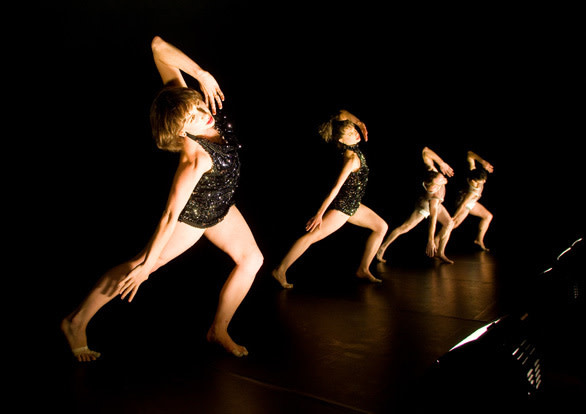TBA 2010: John Jasperse Interview

Image: PICA
Conducting an interview with John Jasperse is sort of like watching one of his dances. Both are likely to send your brain off into all sorts of satisfyingly far and specific reaches; and yet there’s something surprisingly open and gentle about what you experience.
We spoke earlier this week about Truth, Revised Histories, Wishful Thinking, and Flat Out Lies, which I saw late last year in New York and which opens here tonight. A dance for five performers, with a commissioned score by the marvelous Hahn Rowe, the piece is in some very general way akin to Maria Hassabi’s work, in that it marries a gorgeously precise choreographic sensibility with an unsettling ambiguity of meaning or message.
“All of that stuff about sexuality, objectification, misogyny—at certain moments the show is like a Whitesnake video,” he said, laughing, in talking about the dance’s preoccupations with certain themes. “We own that we are doing that, we’re not trying to simultaneously say, ‘Yes we’re using this material but we’re somehow above it.’ When irony is present as a protective layer, that protective layer is saying, ‘Well yes I’m doing that but I don’t really mean that.’ It’s defensible in a kind of way, what the relationship is. Here it’s much more slippery.”
(As I’ve already discussed, I’m prone to adoring slippery art…)
Yesterday I spent about an hour with the Wooster Group film, There Is Still Time…Brother, which also thrums with images of violence and sex, and asks similar questions about what we choose to look at, and why. Like the Woosters, Jasperse uses various film histories and tropes as source material for Truth.
“Somehow there’s something about it that becomes more real in its artifice than if it were real," Jasperse said of his interest in film, including one brutal and beautiful section in which a slow-motion brawl between a man and a woman unfurls in exquisitely choreographed fashion. “What does it mean that I’m enjoying a depiction of violence? You become uncomfortable, and your discomfort relates to your engagement in it."
Ultimately, how we choose to deal (or not) with this engagement is a political matter, one that Jasperse relates to the many disparate but interrelated crises our society is now faced with.
“People don’t want to engage with that; they want the magic genie to wave the wand, and the world will be somehow different and we’ll fix the problem,” he said. “Nobody wants to acknowledge or wrap their head around what that might mean about our identity as a people and as a nation … if you can’t figure out what the solution is, some people are much more comfortable not asking the questions.”
Other people ask those questions a lot. And then all the world becomes a stage. Or is it the other way around?
For more information on TBA events, visit PICA. A more comprehensive list of upcoming events can be found at our Arts & Entertainment Calendar.
